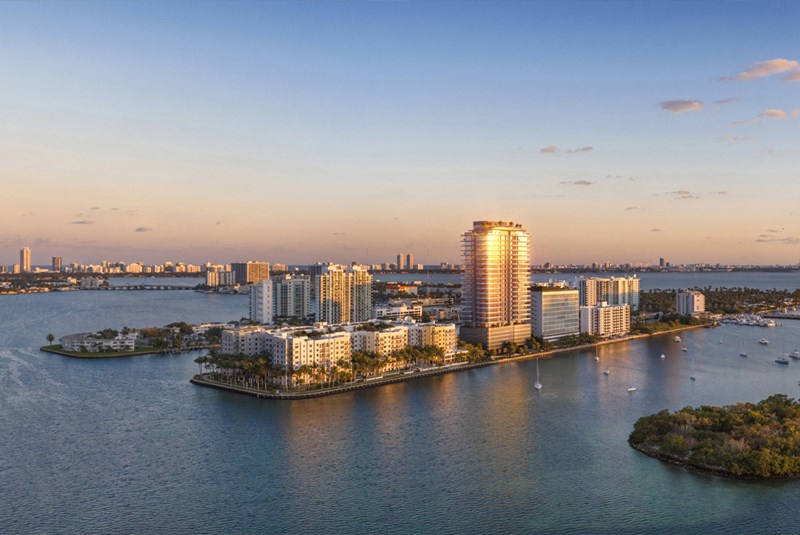Florida and Miami Real Estate Homestead Exemption Portability and Property Tax Savings Benefits Q&A

Jan 23, 2018 January 23, 2018
There are a ton of benefits to staying in Florida. Of course, there’s the great weather, sunny beaches, lots of fun destinations and a whole slew of entertainment options. But, there is also a more practical advantage to calling Sunshine State home, which is Saving Tax Dollars. We’ve already discussed in a previous blog the various tax benefits of becoming a permanent resident of Florida. In this blog, we look deeper into the kinds of property tax savings and exemptions available to permanent residents.
What is the Florida Homestead Exemption and why would I want it?
The State Law in Florida provides homeowners an exemption of up to $50,000 on their primary residence. The first $25,000 of the property value is exempt from all property taxes, including school district taxes. However, the remaining $25,000 is only available for exemption on non-school taxes and is applicable on an assessed value of $50,000 and more.
To skip being too academic about it, if you qualify for Homestead and your property value is at least $100,000, your property value is likely high enough that you will receive the full the $50,000 assessment deduction. Otherwise, feel free to read through the below example for exceptions to that on lower priced properties.
For example:
If Assessed Value = $40,000
The first $25,000 is exempt from all property taxes and only the remaining $15,000 is taxable.
If Assessed Value = $60,000
The first $25,000 is exempt from all property taxes and the next $25,000 is taxable. Further, the remaining $10,000 is exempt from non-school taxes.
If Assessed Value = $80,000
The first $25,000 is exempt from all property taxes and the next $25,000 becomes taxable. The third $25,000 is exempt from non-school taxes and the remaining $5,000 becomes taxable.
The Homestead Exemption makes only part of your property value taxable, providing relief to resident Floridians. But, that’s not all! There is a Save Our Homes benefit that tags along with this exemption to provide further savings on appreciating home values.
What is the Save Our Homes benefit/assessment cap and why would I want it?
According to the Save Our Homes cap, the assessed value of a Homestead property cannot increase more than 3% or the percentage change in the Consumer Price Index (CPI), whichever is less, after its base year.
The most obvious questions here are - how do I qualify, what is a base year and what is the assessed value? While you can read about how to qualify here, the year you Homestead your property is your base year. That year, the property appraiser puts a just/market value (assessed value) on your home. This assessed value becomes the baseline property value for tax purposes. The year after your base year (and in subsequent years), the assessed value is calculated as follows:
Previous Year Assessed Value (PYAV) + lower of (PYAV x 3% or PYAV x CPI%)
For instance, if the market value of your $1 million property increases to $1.25 million the next year, you will be required to pay taxes on no more than $1.03 million. This saves you from paying taxes on a significant $222,000 of your home value, in addition to what’s already exempt under the Homestead laws (typically $50,000 or more).
What’s important to note here is that even as the market value of your property continues to rise over the years, the assessed value (which determines your taxes) increases by no more than 3% annually. So, you can enjoy all the benefits of living in a neighborhood with fast appreciating home values, without worrying about it piling onto your tax bill. And, since the assessed value is for taxation purposes only, when it comes to reselling, you will still be able to sell your home for what it's worth on the market.
Talking about selling, are all these savings lost once you decide to sell or abandon your Homestead? We have more good news for you, if you’re moving within Florida!
What is Portability or the Save Our Homes Portability Transfer?
If you are moving from a Homestead property in Florida to a new Homestead within the State, you can “port” all or part of your Save Our Homes assessment benefit up to a maximum of $500,000. Your Save Our Homes assessment benefit is the difference between your property’s assessed/taxable value and current market value.
For instance, if your previous Homestead’s market value was $500,000, but it’s assessed value was held at $350,000, your Save Our Homes assessment difference/benefit would be $150,000. You will then be able to deduct all or part of this $150,000 from the assessed value of your new home. This means, you will instantly lower the tax bill on your new residence, thus saving hundreds of dollars.
Upsizing vs. Downsizing
Portability benefits are available irrespective of whether you’re upsizing or downsizing. In case, you’re upsizing and claiming a greater value property as your new Homestead, you will receive ALL of the benefit of your previous Save Our Homes cap. However, if you’re downsizing and claiming a lesser value property as your new Homestead, you will receive the same ratio of Save Our Home benefits as you did on your previous Homestead. You can use this tax estimator to find out what you would owe on your new property, or click to see the detailed examples for calculations on upsizing and downsizing.
With a string of benefits starting with the Homestead Exemption, it’s clearly visible how Florida’s permanent residents can shed thousands of dollars off their property tax bill year-after-year. Read on for more information on eligibility and calculations.
How do I qualify for a Florida Homestead Exemption?
You need to fulfill the following three criteria to receive all the benefits, protections and exemptions offered to a Florida Homestead:
- The owner must have legal or beneficial title to the Florida home as of January 1st of the year they intend to claim Homestead.
- The home should be the permanent place of residence for the owner (with the owner residing in the property).
- The owner must apply for the homestead exemption, online or in person, at their county property appraiser’s office (or online/mail if available) between January 1 and March 1 of the year in which they seek the exemption.
To apply for a homestead exemption, homeowners need to file a DR-501 form or apply directly here online. Keep this information handy for the greatest chance of acceptance:
- Ownership of the title or proof of beneficial interest since January 1st
- Your social security number (plus spouse’s, if married)
- Proof that the property is your primary residence. This includes documents such as a Florida driver’s license or identification card, the location of dependent children's schools, utility bills for the property, Florida voter registration proof, etc.
Once all of the above are fulfilled and the application approved, your property will be granted a Homestead status.
How do I qualify for the Save Our Homes benefits?
Once your residence is granted the Homestead status, you automatically qualify for the Save Our Homes assessment cap and all the other benefits it entails. In case your Homestead status changes, you’ll need to know this about the Save Our Homes benefit.
When does Save Our Homes come into effect?
If you purchase a home in, say, July 2017 and apply for its Homestead immediately, the exemption will come into effect by January 1, 2018. The year 2018 becomes your base year (as explained above). And, the Save Our Homes cap will first be applied in 2019.
When do I need Portability and how can I get it?
Portability only becomes relevant if you currently are Homesteaded and want to declare a new Homestead (in other words, if you want to move into a new home). This move could be because you want to rent out your previous Homestead or make another property your primary place of residence. (In both cases the Homestead status of the previous property will be terminated.)
In order to get the benefit of Portability, you need to:
- Apply for Homestead on your new Florida residence using form DR-501.
- File for Portability separately using form DR-501T.
- Make sure that your new Florida Homestead is established within two years of January 1 of the year in which you left the previous Homestead. For instance, if the previous Homestead exemption is abandoned in March 2017, you should establish a new Homestead by January 1, 2019.
How do I calculate the amount transferable under Portability?
As mentioned above, the Save Our Homes assessment difference is calculated by deducting the assessed value of a property from its current market value. This difference is what can be ported/claimed in the new Homestead up to a maximum of $500,000.
When calculating Portability, there are two possible scenarios - upsizing and downsizing. In our example, we will be considering:
Old home’s market value = $250,000
Old home’s assessed value = $150,000
New upsized home’s market value = $400,000
New downsized home’s market value = $200,000
Upsizing - Moving to a home of higher value
Step 1: Calculate Portability/Save Our Homes assessment benefit on old home:
$250,000 (market value) - $150,000 (assessed value) = $100,000 (portable amount)
Step 2: Calculate assessed value of new home:
$400,000 (new market value) - $100,000 (portable amount) = $300,000
Downsizing - Moving to a home of lesser value
Step 1: Calculate Portability/Save Our Homes assessment benefit on old home:
$250,000 (market value) - $150,000 (assessed value) = $100,000 (portable amount)
Step 2: Calculate the Save Our Homes cap ratio:
$100,000 (portable amount) / $250,000 (market value) = 0.4
Step 3: Calculate downsized portable amount:
0.4 (cap ratio) x $200,000 (new market value) = $80,000
Step 3: Calculate assessed value of new home:
$200,000 (new market value) - $80,000 (downsized portable amount) = $120,000
Special Circumstances Affecting Ownership
- When people sell their Homesteads to buy a single Homestead together (commonly due to marriage) the person with the highest assessment difference may port his or her benefits. As with regular Portability, the most that can be transferred is $500,000.
- When people sharing a Homestead move to separate Homesteads (commonly due to divorce) individuals may Port their assessment difference. However, all owners must abandon the previous home in order for the transfer to take place. If the Homestead is separating due to divorce, the husband or wife is allowed to share portability with their former spouse by submitting a DR-501TS form.
Do you love what you see about all the savings that come with being a long-time Florida resident? Then, consider starting today, so you can rack up these tax savings over time too! Contact us to see how we can help.
Also don’t forget to subscribe to our blog on this page, so you can get more useful information on buying and owning in South Florida.
Share your thoughts with us
Your Miami Condo Awaits
Recent Posts







